#but meta knight is a special case because i am terrible at subtlety and he wouldn’t be meta knight without it
Text
let’s do some autistic meta knight headcanons!! over explaining my interpretation of meta knight yet again wooooo
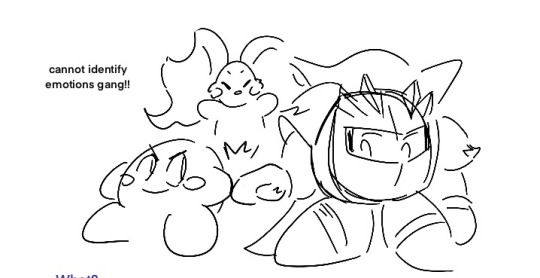
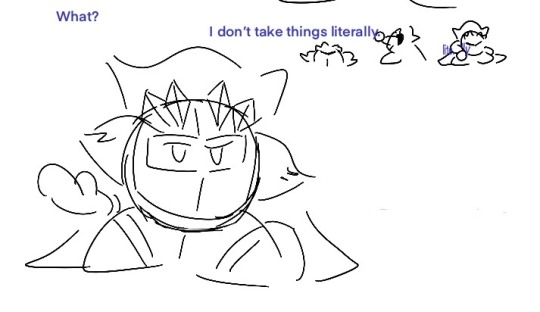
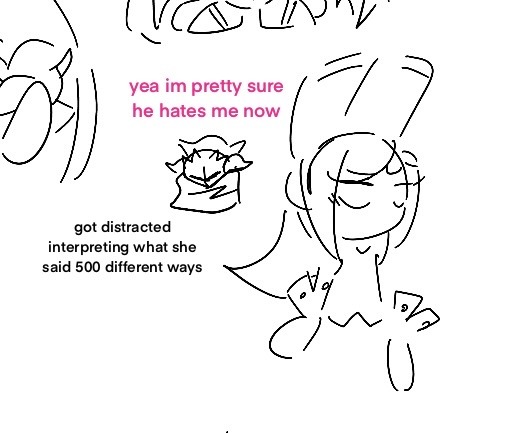
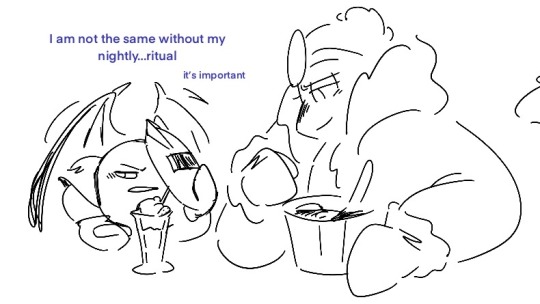
this orb has NO idea how to talk to people!!! outside of work anyway. a lot of this is partially due to upbringing (suppressing his emotions all the time) but he does not know how to express emotions, like…at all.
this goes into a few things
1. yeah talking is hard. even after figuring out what he wants to communicate he will struggle. conversation can be so overwhelming, especially under pressure. he will need time lol
2. because of that, forming connections is hard. i really don’t think meta is much for shallow relationships, and certainly not early in the timeline. which also means he has very little experience with friendship. so a lot of the relationships he did have went kinda neglected, and issues that probably could’ve been worked on by talking became…*cough romk* escalated.
3. honestly i wouldn’t be surprised if meta convinced himself he couldn’t feel emotion (anymore) until like. katam-ish. he tried very hard lol
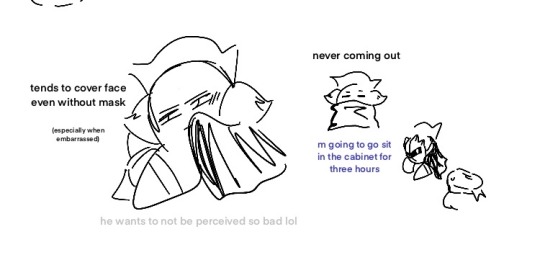
vulnerability is terrifying. (though this gesture here is also just comforting, like his little cape cocoon thing he does.)
unmasking—yeah im taking the mask thing very literally here—is a big deal and a very slow process for mk. i’m sure he has a lot of feelings on that lol. it served as a way to ensure no one could ever, y’know, see him.
i can’t say i think he’d ever fully ditch it—there’s always gonna be some days that are more stressful than others and if having it could help him get through it, it just makes sense. mainly when working.
it really is about vulnerability. granted, i don’t think he has the most expressive face (in my head every astral just tends to stare at things) but i doubt he has much control over it. can’t fake a smile but also can’t hide it. probably blushes easy because yeah, astrals; just look at kirby’s face.
just the idea that someone might be able to read his expression and know what he’s feeling before he’s ready for them to (or even understands it himself…) yeah he doesn’t want that
but emotional turmoil aside, i think his mask also hides a lot of his stims
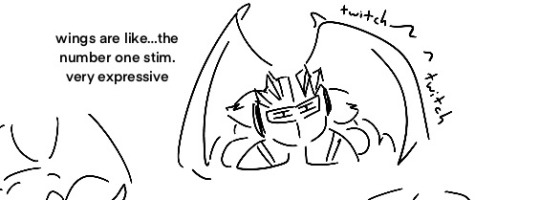
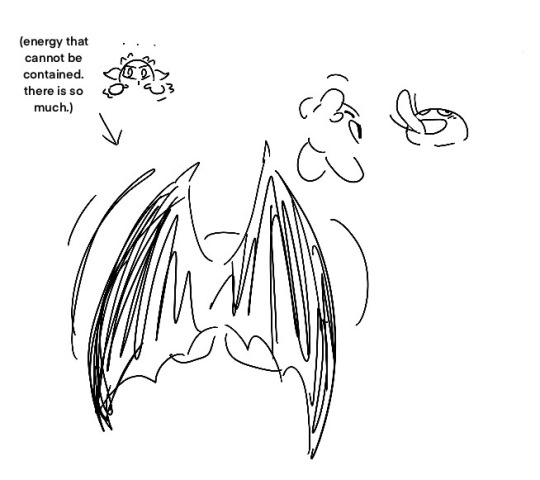
remember that whole “suppressing your feelings” thing? yeah turns out that ignoring half your instincts isn’t a good idea. so in true meta knight style, he tries to stim as subtly as possible
1. he has the least control over his wings, so they will flick and twitch on their own. they’re usually a good indicator of how he’s feeling, not unlike the body language usually seen in cat ears and tails lol. flapping is also an extension of this of course, though he probably suppresses it more.
2. this also effects when he takes his wings out. pretty much every time he’s excited or nervous it just happens. kinda makes me wonder if his wing cape ordeal might also go into the suppression thing… (i’d say yes, but using a cape is also very comforting so it’s not necessarily a bad thing)
3. going back to the mask thing; he stims a lot underneath it. think like biting or pursing your lips. he bites his tongue and clicks his mouth. that sort of thing. his mask also makes it harder to notice that he is constantly sighing, humming, grumbling…all that
one nice thing about the mask though is that it helps a little bit with lights!!! woo

(look at him and his magically floating glasses)
sensory stuff—i think he’s mostly bothered by light and sound. maybe a bit of texture. he’s pretty sensory avoidant and perfectly happy standing off to the side not touching anything.
the one exception to this is physical affection, which is, despite all of this, most of how he shows affection. it’s a lot easier to hug someone than to try to explain your feelings for them, after all.
i think he would like pressure though. so that’s probably part of it. and i’m pretty sure there’s some connection in here to fighting (dang, is that the only way he knows how to get his energy out?)
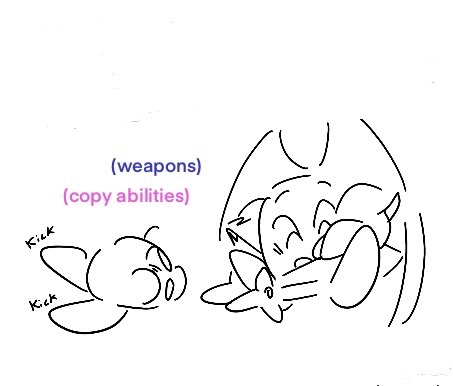
anyway, pretty much all of this is in contrast to kirby, who i would gladly nominate as the champion of Doing Whatever He Wants. he might pick up a few bad habits, but he will never mask the way meta knight does. he might not understand how he feels, but he’s in tune enough to express it…usually.
this is a very good thing for meta because it helps him to do the same thing. kirby’s so energetic, it’s hard to not want to stim with him. it reminds meta to be kinder to himself and explore his own emotions. he can also help kirby understand themselves, so this connection is very important.
yeah, at the end of the day, everything kinda just boils down to kirby and mk as parallels
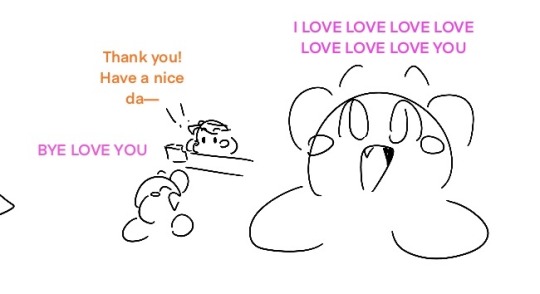
this is the conclusion i promise
to me, meta’s arc is about growing stronger by growing kinder, and this is mostly by learning to be kind to himself. letting himself be a person again, loving and understanding other people, and eventually, letting go of all the expectations placed on him and doing the things he’s always wanted to do…
autism headcanons are fun for me because it’s cathartic to write, but at the same time, it just makes sense in this sort of narrative. meta is, to me, inseparable from these things. and so is kirby! that’s a dynamic that’s a lot of fun to play with, and it’s at the heart of my kirby interpretation.
if you actually read all this WOW thank you
#i almost considered not posting this on a wednesday but then i wrote everything and uhhh yeah i think i gotta so#happy cringe day wednesday#for as many notes as i have on these characters i really don’t talk about it much#but meta knight is a special case because i am terrible at subtlety and he wouldn’t be meta knight without it#so this is to contextualize some things#because of what ill have in the next few days haha#basically these are just things i consider when writing meta#but a lot of it is subtextual and i dont know how well it comes across#kirbyposting#kirby#meta knight#headcanons#autism headcanon#this is practically an essay lol oops#i have like 2/3 of a fic that explores most of this in a way i probably won’t do again#but we’ll see if i ever finish it#god kirby concepts are so fun to chew on#i overthink everything i make so much lol
429 notes
·
View notes
Text
Kris Reacts to Game of Thrones: 701, “Dragonstone”
“Would That Be So Terrible?”
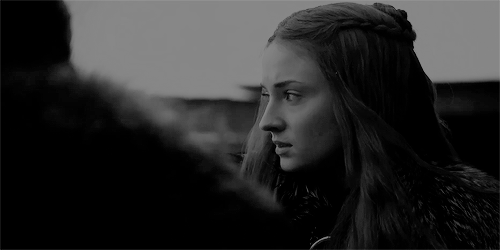
The Setup: I (Kris, aka @omeletsforpepper) am not the only one of us who keeps up with Game of Thrones, but I wanted to try my hand at solo reacting. This could change, but my plan is to pick out a theme (not necessarily “the” theme) of the week’s episode, and discuss in depth just one or two scenes/sequences that involve it. I’ll also include some extra thoughts at the end, in the vein of The AV Club’s “Stray Observations.”
SPOILERS for the season 7 premiere of Game of Thrones immediately after the jump.
Though it isn’t actually one of the scenes I want to spotlight this week — largely because I’m sure it’s the one most discussed already across the internet — the bloody cold open gives us a pretty clear thematic statement: this is an episode about debt, and desert. (As in, the condition of deserving something, spelled like the geographical feature, but pronounced like the thing that comes at the end of a meal.) After killing almost everyone who was still eligible to be punished for the Red Wedding, almost everyone’s favorite Stark turns to the late Walder Frey’s newest wife to deliver not only a certain weather announcement, but also probably everyone’s second favorite Stark line: “The North remembers.”
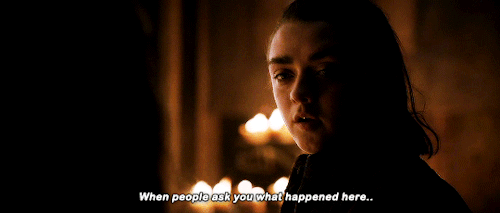
That the North remembers is critical to both Jon and Sansa in the surprisingly nuanced scene that ends with the loyalty oaths of Alys Karstark and Ned Umber. For Jon, Northern and more specifically Stark memory is tied up in the very sense of tradition that kept him a lesser member of his family in the eyes of the late Catelyn, tradition into which he always wanted to be accepted. In spite of everything he’s learned, and all the compromises he’s made, Jon Snow (or should we be calling him Jon Stark now?) still holds as tightly as he can to the ideals and customs of his father. In this case, that means not taking away the ancestral homes of families who fought against him, under the Bolton banner. The Karstark and Umber heirs, both children, will inherit their fathers’ titles. As Sansa points out, although the specific Karstark and Umber men who fought for Ramsay Bolton are indeed already dead, the rest of the North will not receive the message that betraying the Starks will be punished. And more importantly, they will not receive the message that loyalty to the Starks in difficult times will be rewarded.
This is where the “surprisingly” part comes in. Though it’s often been a fiercely intelligent show, and always one that reveled in moral grayness, Game of Thrones isn’t really something I’d describe as subtle, or as being particularly adept with philosophical uncertainty. It has always claimed to be a show concerned with subtlety and ambiguity, but in practice that ambiguity often just meant subjecting characters (partially or completely naked women, disproportionately) to heavy-handed awfulness. Something like Joffrey’s sadistic torture-murder of Ros isn’t a marker of cleverness or depth, it’s Dark and Edgy for the sake of Dark and Edgy. Also, this is just one of those shows that typically doesn’t do subtext in its dialogue. It just has much better-sounding dialogue than your typical network procedural. And that’s not nothing!
A more interesting reason for the show’s incomplete success in delivering on true moral ambiguity is perhaps that it hasn’t often pitted its traditionally heroic characters against each other, especially post-“Blackwater.” But now that the two characters who’ve perhaps suffered most (not that it’s a contest) find themselves at odds, the show’s creative team clearly understands that doing both those characters justice means using a different kind of suspense from the sort that drove episodes like, say, “The Mountain and the Viper.”

We’ll have to wait to see the consequences of Jon’s very public refusal to take Sansa’s very public advice — advice with which most of the Stark bannermen seemed to heartily agree — not only in the military and political spheres, but in Jon and Sansa’s relationship. But I was glad to see that, perhaps owing to Lyanna Mormont’s influence, the men in the room weren’t dismissive of Sansa’s counsel, and were indeed on her side. I was also glad that even when Jon pushed ahead with his own agenda, we weren’t subjected to a repetition of the “everyone sure is angry at Jon” beats we saw so often at Castle Black. Maybe like the men of the Night’s Watch, they’re all tired of arguing with each other.
Or maybe it was that though Sansa very clearly won the logical argument in this scene, Jon kind of got to win the emotional one. Is it really any wonder he’s so opposed to taking away anyone’s ancestral home? It’s not only that he just took back Winterfell. It’s also that Winterfell was, before all of this, never intended to be his ancestral home. He was born a Snow (cough cough, yeah, I know, but the show didn’t go there this week so neither will I), not a Stark. The reclamation of Winterfell doesn’t necessarily mean more to Jon than it does to Sansa, but it does mean something different.
This layer, important as it is for us, probably didn’t occur to the Stark bannermen. For them, the emotional force of Jon’s case is much more concrete once Jon calls forward Alys Karstark and Ned Umber, the former of whom looks no older than Arya was in the show’s very first episode, and the latter of whom may well be younger than Bran was. Look, on the level of strategy, Sansa is right. Sansa is right! Jon is clinging to an ideal for the sake of the ideal, at least as much as because he thinks it’ll help him win. But even as we acknowledge that he’s making a bad decision, we can also acknowledge that there’s something laudable in it. Despite their agreement with Sansa, the bannermen get solemn when those kids — those kids, who indeed do not deserve to be punished for the sins of their fathers — approach their king and bend the knee, and cheer when those kids say the words they have to say. And when Alys Karstark cracks a smile out of what’s surely a heady combination of relief, gratitude, and newfound purpose, we can’t help but be moved.
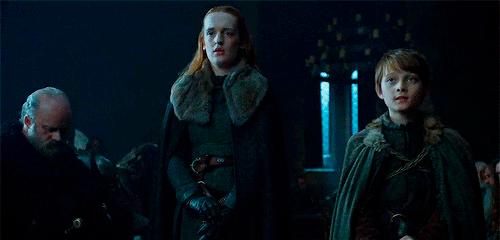
Unless we’re Sansa, tragically world-weary and out of fucks to give. Thank the old gods and the new for her bluntness in calling out the dearly departed Ned and Robb for “stupid mistakes.” And for her quiet but firm response — “Would that be so terrible?” — when Jon asks if being smarter than them means taking her advice. And for Jon’s wisdom in not pushing her away (yet, at least).
Something else to keep in mind about Jon and Sansa: Despite their heartfelt reunion and the shared trial of taking back Winterfell, we should remember that they held no special fondness for each other way back before their lives and the world went to hell. I can’t help wondering if that lack of pre-existing closeness will quietly become a complication now that Jon and Sansa both finally find themselves with the tiniest bit of breathing room.
Of course, Danaerys Targaryen gets the prize for longest-awaited homecoming. (Here’s a cool little Vanity Fair piece about the production design of Dragonstone.) I don’t want to go on much longer here, and I guess there isn’t that much to say, other than that the choice to make this scene almost-wordless was a good one, and that Team Targaryen’s tailor wins.

When it comes down to it, I like the fact of Dany’s arrival to Dragonstone a lot, and I’m still pretty fond of her as a character, and of basically everyone in her entourage. (Varys is one of my very favorite supporting characters on this show.)
But throughout this whole sequence, I also couldn’t shake a meta-criticism, I guess, that the columnist Ross Douthat has made of the show and at least a theoretical subsection of its fans (emphasis mine):
“Game of Thrones” is still working within the framework of its essentially romantic genre — critiquing it and complicating it, yes, but also giving us a set of heroes and heroines to root for whose destinies are set by bloodlines and prophecies, and who are likely in the end to save their world from darkness and chaos no less than Aragorn or Shea Ohmsford or Rand al’Thor.
Put another way: On “The Sopranos,” there is no right way to be a mafioso. But on “Game of Thrones” there is a right way to be a lord or king and knight, and there are characters who model the virtues of each office, who prove that chivalry and wise lordship need not be a myth. Sometimes they do so in unexpected ways — the lady knight who has more chivalry than the men who jeer at her, the dwarf who rules more justly than the family members who look down on him. But this sort of reversal is typical of the genre, which always has its hobbits and stable boys and shieldmaidens ready to surprise the proud and prejudiced. And it coexists throughout the story with an emphasis on the importance of legitimacy and noblesse oblige and dynastic continuity, which is often strikingly uncynical given the dark-and-gritty atmosphere. […] In the end, whatever their politics in this world, both the show’s bad fans and its good fans are rooting a queen or for a king.
I am not, in general, a Douthat fan, mostly because of his hand-wringing in opposition to abortion and other “culture war” matters. But I think he’s a pretty solid pop culture writer, and very often the sort who’s helpful to read precisely because he doesn’t think the same things I think. And in this case, I’m even inclined to agree at least a little.
It’s pretty hard to deny that Game of Thrones has Bad Fans. Most of those Bad Fans are the kind who tweet endless harassment at culture writers who've criticized, say, the show’s use of sexual assault and its racial politics. But I would also love to see more critical and fan engagement with the idea that our designated protagonists are all protagonists-by-blood.
(One of the reasons for my arguable lack of generosity toward my fellow viewers here is that I remain convinced that Steve Rogers’ position in Captain America: Civil War is baldly anti-democratic, and that #TeamCap loyalists generally fail to reckon with this.)
Yes, Jon and Dany and Tyrion have all learned a lot that in theory makes them worthy of leadership. But does any of that actually mean that Dany (let’s just focus on her, for word count’s sake) deserves to be Queen of Westeros? More so than Cersei, sure. But should we really assume that the war has to end with one of our heroes on the Iron Throne? And is Dany actually entitled to any throne at all? Not really, if we’re honest. There’s no great moral case for her to have left Essos, where she could have still done a lot of good (setting aside, too, the White Savior thing). She left Essos because she felt entitled to a throne her family had abused for generations, in a land she barely remembers, full of people about whom she knows next to nothing. She wants to prove that she can be a better monarch than those who’ve gone before her. Tyrion wants to see her be a better monarch. Varys wants the country to stop bleeding. That all matters. But none of it is the main reason Dany started out on this path before meeting either of her newest advisors.
I’m not saying that Game of Thrones, or A Song of Ice and Fire, needs to end like the first year of Ta-Nehisi Coates’s run on Black Panther, with Wakanda finally beginning the process of writing up a constitution to distribute power away from its monarch. And I definitely doubt that it’ll go that way.
But also, um, why couldn’t it? Why shouldn’t it?
Would that be so terrible?
I Don’t Want to Just Call This Section “Stray Observations” but I Don’t Have a Different Name for It Yet Either and Sure I’ll Take Suggestions
Anyone else want to see Brienne spar with Tormund?
I have, for all practical intents and purposes, no real idea who Ed Sheeran is, so I actually really liked that scene of Arya with the Lannister soldiers. Another Surprisingly Nuanced moment. (If you feel the same way I do about the Surprisingly Nuanced thing, definitely read Matt Zoller Seitz on GoT’s grappling with its own legacy).
People not only cross oceans very quickly in this show, but build ships very quickly.
Heh.
When I read A Game of Thrones forever ago, I pictured Thoros of Myr as kind of a Shaolin monk type. I don’t know if that’s what GRRM pictured, but I still wish it was the case. I mean I like this Thoros just fine. But, you know. Asian representation. Just would’ve been cool.
I’ll try to be back here next week! In the meantime, you can follow us on Twitter if you’d like a convenient feed of other, better, culture writers.
#Game of Thrones#Dragonstone#Sansa Stark#Jon Snow#Daenerys Targaryen#Kris#reaction#TV#got season 7#got spoilers#Kris reacts to GoT
9 notes
·
View notes